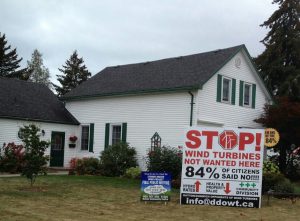
February 27, 2020
Recent news from New York State and Arizona indicate a disturbing trend in the United States. With the awareness of negative impacts on the environment and human health from industrial-scale or grid-scale wind turbines rising (together with discontent over rising electricity costs), opposition to wind power projects has become vocal and powerful.
The answer?
Legislate their approval no matter what and obliterate the possibility of any opposition from communities.
Quoted in an article in today’s Post-Journal, NY Senator George Borrello said the move to fast-track wind power projects by Governor Cuomo is clearly aimed at “crushing” any citizen opposition. Borrello said:
“The governor’s 30-day amendment to accelerate renewable energy projects is a maneuver designed to bypass Article 10, which established a siting process for these projects that, appropriately, included local input. Now, in order to advance an extreme environmental agenda, he is proposing to eliminate home rule in order to force these renewable energy projects on communities. This is bypassing local zoning and crushing any opposition. In order to meet his environmental targets, these projects will need to be constructed on a massive scale and with a density that will literally change the face of upstate New York, transforming it into a barren industrial wasteland. Countless acres of farmland will need to be blanketed with solar farms. Our beautiful shorelines will be marred by the sight of massive mechanical wind turbines towering over the water.”
Ontario’s Green Energy Act passed in 2009 by the government under Dalton McGuinty, did much the same thing, removing all local land-use planning powers with regard to renewable energy projects. The current Ontario government returned those powers but few municipal governments have followed through on the opportunity to protect their citizens from negative impacts of potential wind power developments by enacting protective zoning bylaws.
The democracy-killing trend is not unanimous, however: In Ohio, the state government is considering legislation that will allow communities to hold a referendum for a proposed renewable energy project.
“No one should underestimate the influence of the well-funded wind power lobby,” says Wind Concerns Ontario president Jane Wilson.
CanWEA, the Canadian wind lobbyist, has been approved for Intervenor status in the court action over the revoking of the Renewable Energy Approval for the Nation Rise wind power project. The Ontario environment minister said in a letter to the community group which had appealed the approval that the power from the project wasn’t needed, and proceeding on it was not worth the environmental risks.



1 Comments
Richard Mann
Wind turbines can impact humans to 10km and possibly more. We need urgent action, to stop Industrial Wind Turbines now due to known health harm. This is not an economic issue it is an ethics issue. Please ask anyone who denies health harm of Industrial Wind Turbines to watch this presentation. University of Waterloo, Waterloo Ontario Canada.
Title: “Infrasound and Low Frequency Noise: Physics & Cells, History & Health”
Speaker: Dr Mariana Alves-Pereira
Location: University of Waterloo
Date: September 12, 2019
Video archive of presentation:
https://livestream.com/itmsstudio/events/8781285
Dr. Alves-Pereira’s research profile is at www .researchgate.net/profile/Mariana_Alves-pereira
Note; there is approx 2 mins of dead air at the beginning. The talk is ~50 minutes, followed by a long Q&A